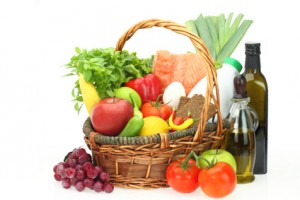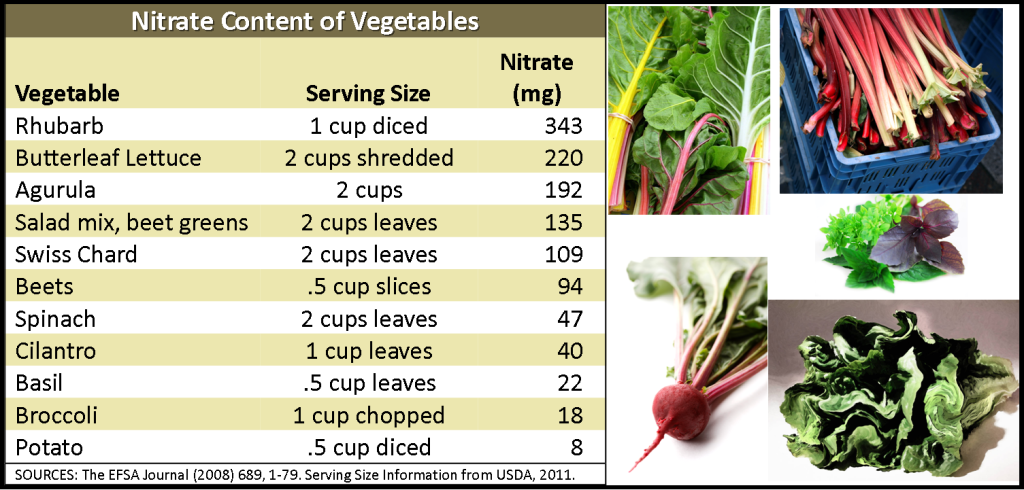This week, read about the Mediterranean diet and longevity, benefits of nitrates from vegetables, running to stay young, worrying about wheat, and more.
Could a Mediterranean Diet Extend Your Life?
 Harvard Medical School researchers found that adherence to a Mediterranean-style diet was associated with longer telomeres in women. Telomeres are recently-discovered structures on the end of chromosomes that help protect from DNA damage. As cells age, telomeres shorten and don’t function as well, increasing susceptibility to chronic disease. Studies have linked telomere shortening to many conditions, including diabetes, cancer, Alzheimer’s, and cardiovascular disease. This study was correlational, and research on telomeres is preliminary, but nonetheless provides interesting questions to follow up with future research. I wrote about a recent study suggesting that life stressors influence telomere length here. (BMJ, December 2014).
Harvard Medical School researchers found that adherence to a Mediterranean-style diet was associated with longer telomeres in women. Telomeres are recently-discovered structures on the end of chromosomes that help protect from DNA damage. As cells age, telomeres shorten and don’t function as well, increasing susceptibility to chronic disease. Studies have linked telomere shortening to many conditions, including diabetes, cancer, Alzheimer’s, and cardiovascular disease. This study was correlational, and research on telomeres is preliminary, but nonetheless provides interesting questions to follow up with future research. I wrote about a recent study suggesting that life stressors influence telomere length here. (BMJ, December 2014).
A typical Mediterranean diet is rich in whole grains, vegetables, fruits, legumes, nuts, fish and olive oil. Of note, consumption of individual dietary components were not linked with telomere length in this study, highlighting the importance of looking at overall dietary patterns and health, and not just separate components.
Nitrates in Vegetables Have Many Potential Benefits
The science of nitrates in vegetables continues to evolve, highlighting potential health and sports performance benefits. Researchers from the Universities of Southampton and Cambridge conducted three new studies that add to the evidence on health benefits, suggesting that nitrate-containing vegetables can improve the heart’s efficiency, blood supply to organs, and reduce risk of diabetes and obesity. (FASEB j November 24, 2014; J Physiol 592:4715-31, 2014; Diabetes, 2014 DOI: 10.2337/db14-0496).
Until recently, nitrates were considered toxic, and long-term exposure thought to increase cancer risk, which is at odds with the growing body of research highlighting the protective effects of vegetables, many of which are nitrate-rich. In fact, dark leafy greens, which are the richest vegetable sources of nitrates, are all-stars when it comes to promoting health. As evidenced by the research noted above, many experts question these early studies, and now believe that the naturally occurring nitrates in vegetables may be responsible for some of the cardiovascular benefits of vegetable-rich diets. It’s important to remember that nitrates in vegetables occur naturally and come packaged with a host of health-protective compounds (minerals, vitamins, antioxidants).
Leafy greens are some of the best nitrate sources. By weight, arugula is the clear winner, boasting 480 mg nitrates/100g (almost twice as much as a cup of beet juice). But that’s 5 cups of arugula. . . so I”ve made a table (below) that lists some nitrate levels based on more reasonable serving sizes. Note that nitrate values are approximate, since content varies considerably depending on soil, location, time of year, and other variables.
You can get an idea of the nitrate content of other vegetables in this table or this publication. Remember – a health-promoting diet should include nutrients from a variety of vegetables, so don’t limit your vegetable intake to high-nitrate varieties. Consider that broccoli and carrots, which are low in nitrates, offer plenty of disease-fighting nutrients.
Other Links of Interest This Week
How the Brain Uses Glucose to Fuel Self-Control. Stanford neuroendocrinologist Robert Sapolsky does a nice job explaining the vast amount of energy the brain uses, and how low glucose levels influence self-control. (Wall Street Journal)
Run to stay young. This study found that running has superior “anti-aging” benefits to walking: 70-year-old runners had about the same walking efficiency as your typical sedentary college student, while older walkers lost some pep in their step. Researchers speculate that runners have developed more efficient mitochondria and better muscle coordination overall. Of note, many of the study volunteers had started running in their 60’s. Though not examined in this research, other activities that with greater intensity than walking are likely to provide similar health benefits. (Gretchen Reynolds, New York Times, reporting about study in PLOS One November 20, 2014).
Who Pays Attention to Calories? Mostly women, college-educated people, and rich people (generally those who are likeliest to already be a healthy weight in the first place). This doesn’t mean Nutrition Facts labels aren’t a good idea, but more education is needed so that the people who need this information the most learn how to use it. (The Atlantic)
Top 2014 Cancer Prevention Stories (and how they affect you). More great information from the American Institute for Cancer Research. (AICR.org)
Should you worry about wheat? Many current fad diets are based on fear mongering about this grain. UC Berkeley Wellness does a nice job clearing up four myths about wheat. Another good review of the wheat shunning fad is provided here by McGill’s Joe Schwartz.
21 Year Study Of Danish Olympic Rower Shows remarkable 2-decade maintenance of peak physical performance. (Neomatica)
See More Issues of This Week in Food, Health, and Fitness
Share This:
